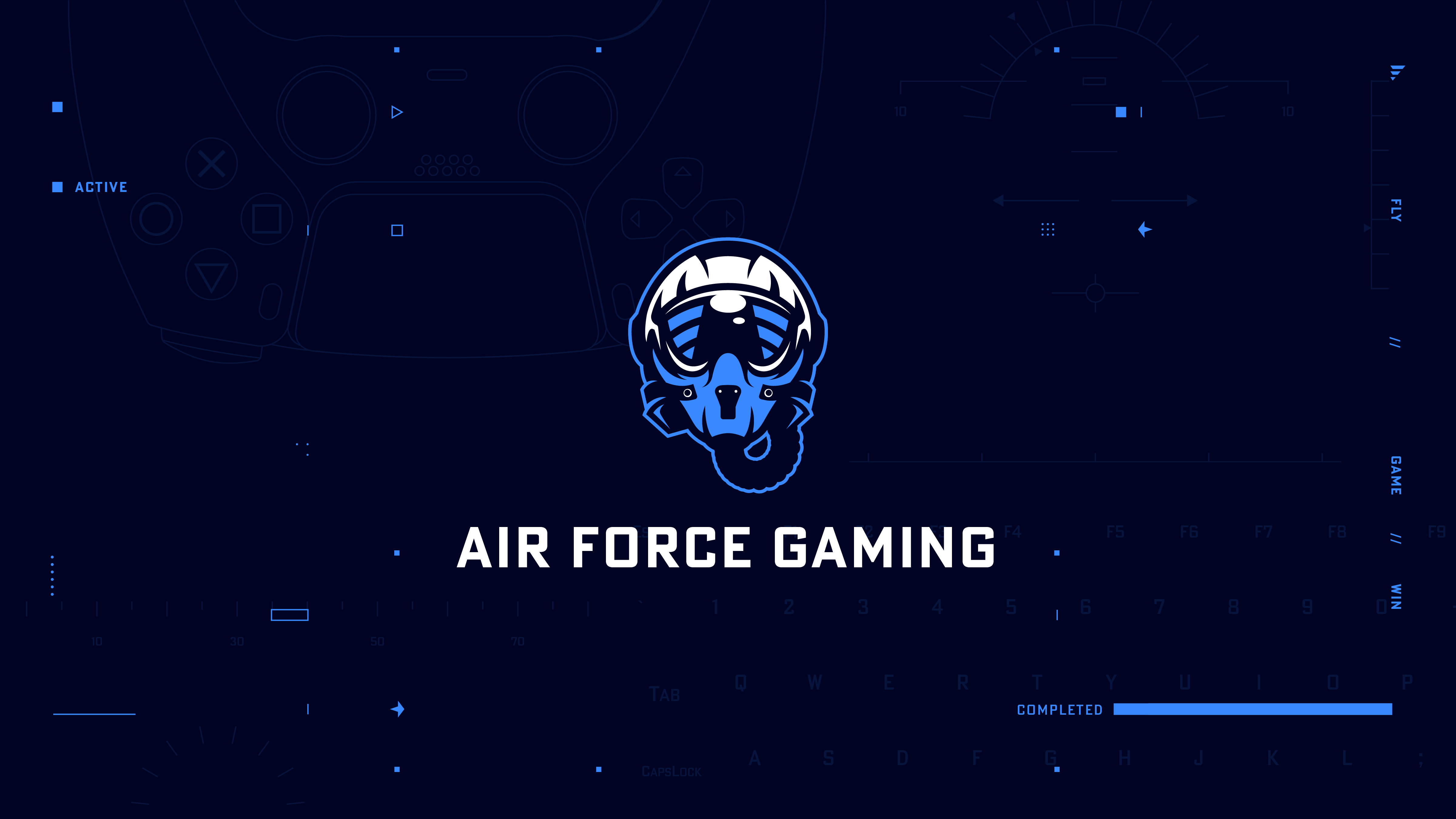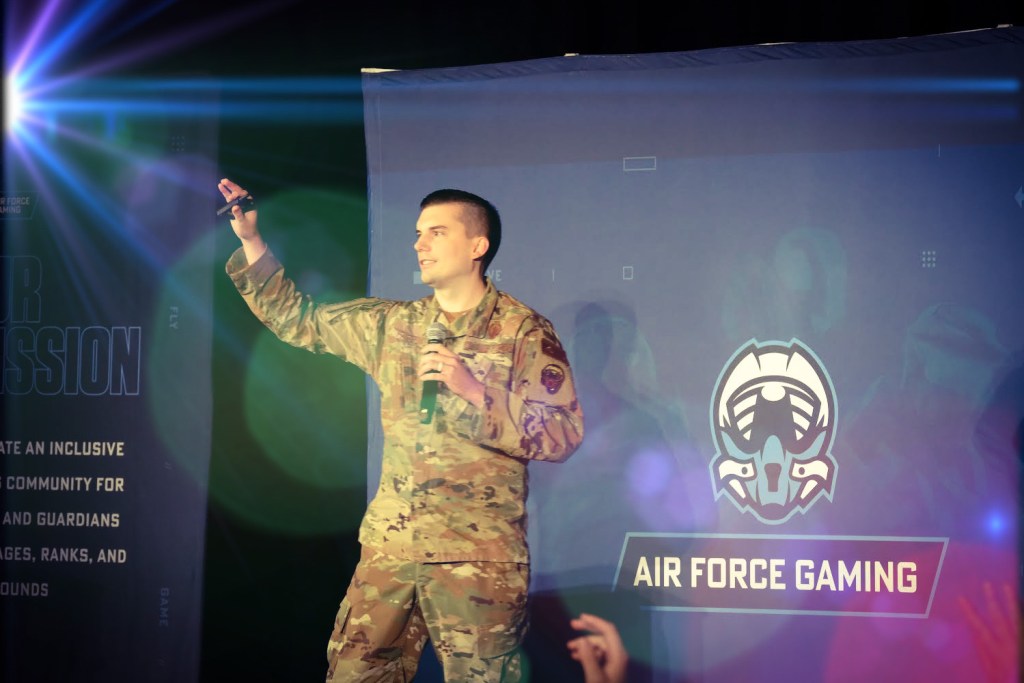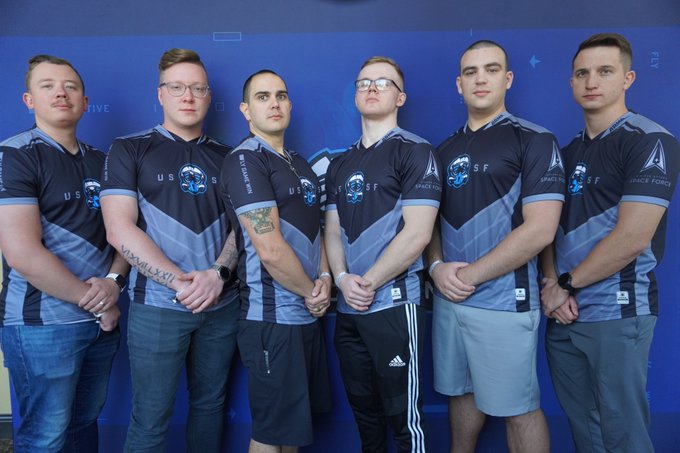

The Air Force gets a lot of grief from the other services with jokes like “Chair Force.” Its sister branch and newest service, Space Force, might be getting even more taunts. So when you think of the Airmen and Guardians on their esports teams you might easily believe some of the stereotypes: “They’re just second-rate gamers hired for recruiting;” “They’re not doing their actual jobs;” Alternatively, “Their jobs are so easy that they have time to play games.” None of these could be further from the truth.
Despite ongoing operational requirements, a global pandemic and limited resources compared to the other services, the founders of Air Force Gaming have brought together thousands of active duty gamers from across the world in less than a few months. With competitions spanning from Rocket League to Call of Duty to League of Legends, the best gamers from the league are rising to compete in national tournaments and their winning, living up to the program’s motto; Fly, Game, Win.
The Air Force and Space Force esports teams recently competed in Rocket League against Army, Navy and Coast Guard at the Rugbytown Sevens Esports Cup in Denver. During the tournament, a team from We Are The Mighty sat down with some of the Airmen and Guardians to learn more about them and the Air Force Gaming Program. Given that some of the gamers come from operational units we’ve kept out ranks and duty station locations.

Cpt. Oliver Parsons, Air Force – Founder of Air Force Gaming League
Cpt. Oliver Parsons got into streaming which brought him to TwitchCon 2019 where he saw the US Army Esports team. Realizing the benefit that an Air Force esports team could bring to his branch, Parsons emailed the Air Force Recruiting Service Commander, Maj. Gen. Jeannie Leavitt. “Thirteen minutes later, I got a response,” he recalled. Maj. Gen. Leavitt loved the idea and directed her staff to bring the concept of Air Force Gaming to life. Following the development of a Discord community and Facebook group, a soft launch resulted in over 2,000 Airmen and future Guardians joining in just 24 hours. Because the program could offer so much to the Air Force community, recruiting passed it onto the Air Force Services Center responsible for the service’s morale, wellness and recreation. The program found new roots under AFSVC and executed a full experimental launch in early 2020, just before COVID. “From January to April/May, we grew to about 5,000-6,000 verified users,” Parsons said. Simultaneously, his new mental health medication disqualified him from nuclear operations. This worked in Parsons’ favor and he was cross-trained to Force Support and PCS’d to Joint Base San Antonio to work directly for AFSVC. “I basically created my own job with the help of some amazing people,” Parsons said happily. “It was a right place, right time, one in a million chance that it happened and it’s truly a blessing.” He now manages the Air Force and Space Force Esports teams along with the massive Air Force Gaming community as a whole. Parsons helps to maintain a secure, positive and supportive community of Airmen and Guardians through the world of gaming.

Col. Marc Adair, Air Force
Col. Marc Adair has been in the Air Force for 24 years and serves as the Director of Operations for the Air Force Services Center. A former college football player and Air Force Rugby team member, Adair was a natural fit for the position. “[I] jumped at the opportunity to be here and to run the Air Force sports, esports, the fitness centers…just really really taking care of people; it’s been awesome,” he said. More than just recreation, Air Force Sports brings together the best Airmen and Guardians from the Air Force and Space Force to represent their respective services in competition. This includes Esports. “They go through the exact same rigor and trial camps that you’d find any of the [other] athletes do,” Adair said.

The concept of Air Force Gaming was first presented to Adair by the Chief Master Sergeant of the Air Force who was inspired by the Army’s professional esports team (separate from Parsons). Initially skeptical of gaming as a sport, Adair’s views were changed when he learned of Parsons’ work with Recruiting. “It was happening anyway,” he recalled, “so we could jump onboard or not.” Air Force Gaming now has over 19,800 registered users and over 31,000 social media followers. Seeing this virtual community grow and bring Airmen and Guardians together from around the world, Adair sees a very bright future for intramural and competitive Air Force Esports and its ability to aid in mental health. “Already I’ve been able to see the resiliency that it’s been able to provide to Airmen, even deployed Airmen,” he noted, highlighting words of support and encouragement offered to wingmen who are struggling overseas. “These aren’t just gaming conversations, they’re real conversations.” Adair himself has gotten into gaming with games like Fortnite, Call of Duty and Rainbow Six: Siege.
Rob P., Space Force – Coach
Rob enlisted in the Air Force in 2004 and later commissioned into the Space Force. Growing up, he played many sports including rugby, soccer and football. However, he was also an avid gamer. “Video games have been a part of my life for my entire life,” he said. “It’s a great way to decompress.” Having gone on multiple deployments and knowing firsthand the strain military duties can have on a person, Rob became involved in Air Force Gaming. Upon transitioning to the Space Force, he started scouting for gamer Guardians to build an esports team. “I looked for players who worked well together,” he recalled. “When they’re on the field, rank means nothing.”

Like their service branch, the Space Force Esports team is new — only a few months old. However, they play well as a team and Rob leans on his military leadership experience to coach them through games. Rob serves as a mission processor in missile warning — taking raw data, interpreting and analyzing it. “A lot of the things I do in the real world are what I’m doing here,” he said. As the coach, Rob oversees training, develops strategies, watches plays in matches and guides the team to perform their best. On top of the competition, Rob places emphasis on enjoying games and the positive impact they can have on mental health. “It helps pull me out of the dark space,” he said, recalling times of depression. “Everyone has their coping mechanisms; mine is playing video games.”
Andrew G., Space Force – Player Rocket League
Andrew is a cyberspace operator focusing on missions across the globe and even out of it. Growing up, he played soccer competitively and went on to play at the Air Force Academy. “I joined the military to make my parents proud,” he said. As an avid gamer and competitive soccer player, Andrew was a natural fit for Air Force Gaming. “Gaming has always been an avenue of connection to those closest to [me],” he said, noting that he would game with his friends and family. “I’ve always been a competitive individual…that’s what pulled me into esports, specifically Rocket League. The game is basically car soccer.”

Andrew enjoys applying the same dedication he had in competitive soccer to esports. “It’s a challenge to become better,” he said. “You’re always trying to improve yourself.” Using replay analysis, developing team tactics and sticking to a personal training regimen, Andrew aims to improve himself as a player and help the team improve as a whole. However, he still trains in physical sports and hopes to bridge the gap to esports and break the stereotypes people have of it. “I’m a triathlete; I’m training for Ironmans. I try to do well at work and be a strong military figure and officer,” he said. “No matter how good you are, you still get that look when you tell leadership, ‘I’m about to travel across the world to go play video games.'” Andrew hopes to open people’s minds to the benefits of esports and gaming in general. “These guys in the Space Force, I may have never met if it wasn’t for our combined interest in Rocket League.”
Austin B., Air Force – Player Rocket League
Austin is one of four airmen who competed in the Rocket League tournament. The 23 year old hails from St. Louis and was committed to playing college baseball until an injury took him out of the game. Unable to pursue a career in baseball, Austin joined the Air Force. “I looked at this as a way to kind of find a new path for myself,” he said. Now, Austin works at an AWACS training squadron, helping to manage the training of 60-70 airmen at a time and keep them on track. However, the former baseball player yearned for competition and found it in the Air Force Gaming community. “There was a big tournament to even qualify to be on the team,” Austin recalled of the 20-week selection process.

“For Rocket League, there were over 200 teams total [that] we had to compete with.” He’s played the game since 2017 and applies lessons he learned in baseball and the Air Force to his gaming. “I think Rocket League focuses more on teamwork,” Austin noted. “You can’t really have one guy not pulling their weight. Sports in general, you have to rely on your teammates.” Of course, balancing esports with a military commitment is difficult. Three of the team members are stationed together and two are flyers. With conflicting and sometimes unpredictable schedules, finding the time to practice together is a challenge. “But, when we do get the opportunity to all play, we all commit to it and sit down and get our time in,” Austin said of his teammates. Although the Air Force Gaming community is new, Austin looks forward to competing against the other services and civilian teams. “I think it’s headed in the right direction,” he said. “It’s just bringing people together.”

